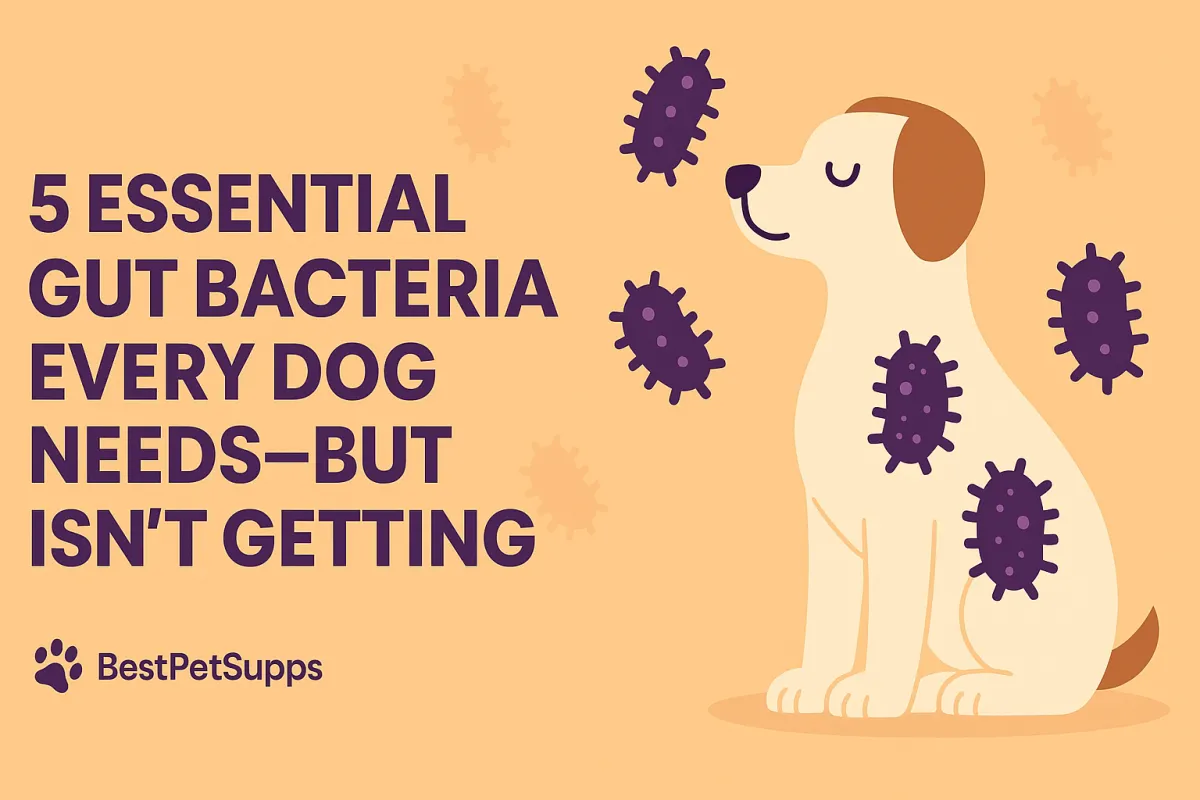The Most Effective Way to Add Years to Your Pet's Life

It’s easy to miss what you can’t see — especially when it comes to your dog’s health.
But if your pup has been dealing with gas, itching, loose stools, or low energy, there’s a hidden factor you might be overlooking.
We’re talking about their gut.
In this article, we explore the
5 essential gut bacteria every dog needs — and why most aren’t getting them from food alone.
These powerful microbes play a huge role in digestion, immunity, mood, and even how fast your dog ages.
The good news? With the right support, you can help restore your dog’s gut health — and unlock a happier, healthier, more vibrant version of them.

5 Essential Gut Bacteria Every Dog Needs — But Isn’t Getting
We all want our dogs to live long, healthy, tail-wagging lives. But what if we told you that one of the most important keys to your dog’s health is something they’re likely missing?
We’re talking about gut bacteria — specifically, the right kinds.
Just like in humans, your dog’s gut is filled with trillions of bacteria that regulate digestion, support the immune system, and even affect mood and behavior. But modern diets, stress, and medications are disrupting this balance — and many dogs are now missing the key strains they need to thrive.
Here are 5 of the most essential gut bacteria strains every dog needs — and why they matter.
1. Lactobacillus acidophilus
This well-known probiotic is a digestive powerhouse. It helps break down food, produce essential vitamins, and crowd out harmful bacteria.
In dogs, L. acidophilus has been shown to:
Improve stool consistency
Reduce diarrhea and gasSupport overall gut function
It also helps maintain a healthy pH in the digestive tract, making it harder for harmful microbes to take hold.
2. Bifidobacterium animalis
This strain is especially important for dogs because it’s been clinically shown to help with:
Improving bowel regularity
Strengthening immune response
Reducing inflammation in the gut
It lives in the colon, where it helps ferment undigested food and produces short-chain fatty acids that fuel healthy gut cells.
3. Lactobacillus plantarum
Known for its resilience, L. plantarum can survive tough environments (like stomach acid) and make it to the intestines intact.
Once there, it helps:
Reduce bloating
Ease symptoms of food sensitivities
Enhance nutrient absorption
It’s also been linked to better skin health and reduced allergic reactions in dogs.
4. Enterococcus faecium
This one sounds a little scary, but it’s actually a hero when it comes to canine gut balance.
E. faecium is commonly used in veterinary probiotics because it:
Competes with harmful pathogens
Helps restore healthy flora after antibiotics
Supports digestive regularity
It’s especially helpful for dogs recovering from illness, stress, or medication.
5. Bacillus coagulans
This spore-forming probiotic is like a tank — it survives heat, stomach acid, and long storage, making it perfect for supplements.
Once it gets to the gut, it:
Boosts immune function
Supports healthy digestion
Produces enzymes that aid in nutrient breakdown
It also helps reduce gut inflammation and supports overall resilience in dogs.
Why Your Dog Isn’t Getting These Naturally
Most commercial dog foods are heat-processed, which kills off beneficial bacteria. Even those that claim to be “fortified with probiotics” often contain only a tiny fraction — and not the strains your dog really needs.
Plus, things like antibiotics, stress, travel, and environmental toxins can wipe out your dog’s good gut flora fast.Without regular replenishment, the bad bacteria start to take over.
That’s when you see:
Itching and licking
ScootingRunny poop
Gas or bloating
Low energy or mood
Recurring infections
How to Restore Balance
The best way to support your dog’s gut health is with a daily probiotic that includes these 5 essential strains.
We recommend Pawbiotix — a vet-formulated, bacon-flavored chew that makes it easy to give your dog the beneficial bacteria they’re missing.Pawbiotix includes:
All 5 of the strains listed above
Prebiotics to help them grow
Digestive enzymes
And anti-inflammatory support
Thousands of pet parents have seen dramatic improvements: smoother digestion, happier mood, shinier coat, and fewer vet visits.
